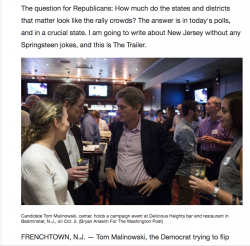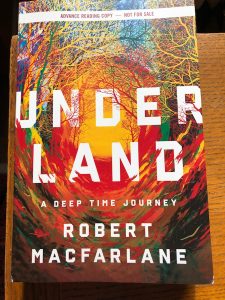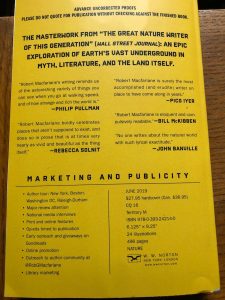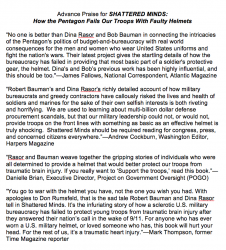Spring Arriving in My London Nabe
/0 Comments/in Art, Photography, Design, Personal History, Family, Friends, Education, Travels /by Philip TurnerVisiting Britain, Feb 19-April 1—Books, Brexit, and Beyond
/0 Comments/in Art, Photography, Design, Personal History, Family, Friends, Education, Travels, Philip Turner Book Productions, Publishing & Bookselling /by Philip TurnerAs I recently posted on Facebook, I’m excited that my wife, Kyle Gallup, a painter, has been invited to do an artist’s residency in London for the month of March. The sponsor is the long-established British paint company Winsor & Newton. They’ve selected a British painter, and an American, Kyle, and are providing them with art materials and studios in the same building as where their paint chemists work. They want the two sides, chemists and artists, to interact with each other, and thus improve the formulation of their new line of cadmium-free watercolors. A lovely idea, really.
I am taking the opportunity to travel with Kyle, which will also allow me to attend the London Book Fair March 12-14, for which I’ve made appointments to meet with British publishers and literary agents. We are flying to Scotland tomorrow where we’ll visit friends for a few days, then begin journeying through the North of England till we reach London on March 1. I plan to write for this blog and in my social networks about being in Britain as Brexit looms. My reading material will include Underland: A Deep Time Journey by a favorite British author Robert Macfarlane, being published in the US in June by W.W. Norton. I’ve loved earlier books by Macfarlane, including The Old Ways: A Journey on Foot and Mountains of the Mind: A History of a Fascination. I’m confident that reading Underland while touring Britain and staying a month in London will be a tonic regardless of the news in the UK and from the US.
“Shattered Minds: How the Pentagon Fails Our Troops with Faulty Helmets,” Publishing March 1
/0 Comments/in Book Biz, Philip Turner Book Productions /by Philip Turner I’m excited that Shattered Minds: How the Pentagon Fails Our Troops with Faulty Helmets will be published by Potomac Books on March 1, 2019. In 2016, I wrote about research in to new materials that could improve the safety features of military helmets. And as I explained in a 2018 blog post, I originally commissioned the book in 2008 when I was acquiring new titles for Union Square Press. After I left that job, the contract was canceled, and almost a decade later I ended up as the agent for the book, placing it with Potomac Books last year. A circuitous path, indeed. Below are the superb pre-publication blurbs the book by Robert H. Baumann and Dina Rasor has received. I’m delighted to see this early reception for the book.
I’m excited that Shattered Minds: How the Pentagon Fails Our Troops with Faulty Helmets will be published by Potomac Books on March 1, 2019. In 2016, I wrote about research in to new materials that could improve the safety features of military helmets. And as I explained in a 2018 blog post, I originally commissioned the book in 2008 when I was acquiring new titles for Union Square Press. After I left that job, the contract was canceled, and almost a decade later I ended up as the agent for the book, placing it with Potomac Books last year. A circuitous path, indeed. Below are the superb pre-publication blurbs the book by Robert H. Baumann and Dina Rasor has received. I’m delighted to see this early reception for the book.
Advance Praise for SHATTERED MINDS:
How the Pentagon Fails Our Troops with Faulty Helmets
“No one is better than Dina Rasor and Bob Bauman in connecting the intricacies of the Pentagon’s politics of budget-and-bureaucracy with real world consequences for the men and women who wear United States uniforms and fight the nation’s wars. Their latest project gives the startling details of how the bureaucracy has failed in providing that most basic part of a soldier’s protective gear, the helmet. Dina’s and Bob’s previous work has been highly influential, and this should be too.”—James Fallows, National Correspondent, Atlantic Magazine
“Dina Rasor and Robert Bauman are some of the most experienced and tenacious advocates in America. Year after year, Dina and Bob have been sounding the alarm and demanding accountability on behalf of our troops and veterans. They have changed policies and helped save lives. And they always have our back. Dina’s and Bob’s critical voices must be heard—now more than ever.”—Paul Rieckhoff, CEO and founder of Iraq and Afghanistan Veterans of America and author of Chasing Ghosts
“Robert Bauman’s and Dina Rasor’s richly detailed account of how military bureaucrats and greedy contractors have callously risked the lives and health of soldiers and marines for the sake of their own selfish interests is both riveting and horrifying. We are used to learning about multi-billion dollar defense procurement scandals, but that our military leadership could not, or would not, provide troops on the front lines with something as basic as an effective helmet is truly shocking. Shattered Minds should be required reading for congress, press, and concerned citizens everywhere.”—Andrew Cockburn, Washington Editor, Harpers Magazine
“Rasor and Bauman weave together the gripping stories of individuals who were all determined to provide a helmet that would better protect our troops from traumatic brain injury. If you really want to ‘Support the troops,’ read this book.”—Danielle Brian, Executive Director, Project on Government Oversight (POGO)
“You go to war with the helmet you have, not the one you wish you had. With apologies to Don Rumsfeld, that is the sad tale Robert Bauman and Dina Rasor tell in Shattered Minds. It’s the infuriating story of how a sclerotic U.S. military bureaucracy has failed to protect young troops from traumatic brain injury after they answered their nation’s call in the wake of 9/11. For anyone who has ever worn a U.S. military helmet, or loved someone who has, this book will hurt your head. For the rest of us, it’s a traumatic heart injury.”—Mark Thompson, former Time Magazine reporter
Campaigning for Democrat Tom Malinowski in NJ-7
/0 Comments/in News, Politics, History & Media, Personal History, Family, Friends, Education, Travels /by Philip TurnerNov 7 Update: Tom Malinowski defeated Leonard Lance in NJ-7. Yippee!
—
Update to this post a few hours after publishing it on Sunday, Nov 4—I see that Tom Malinkowski is featured on the front page of Washington Post reporter Dave Weiegel’s daily campaign trail report. So here’s a link to Weigel’s piece and screenshot of the opening about Malinowski below—with a quote from the candidate about the fact that while he’s talking a lot of about healthcare, in his suburban district he’s also talking with voters about Trump’s hateful rhetoric about immigrants—followed by my original post. 
 Had a productive day Saturday campaigning for Tom Malinowski, DEM candidate for the House in #NJ7. I’ve been aware of Malinowski for several years, from when he worked on the National Security Council for the Obama administration in human rights initiatives, with a strong background in diplomacy and foreign affairs. He has an interesting background, having been born in Poland, and emigrating with his mother to the US when he was six years old. An overwhelming number of volunteers answered the call for the noon-3pm shift in the town of Summit, about an hour train ride from Penn Station in Manhattan. We made a pleasant 15-minute walk to and from the station.
Had a productive day Saturday campaigning for Tom Malinowski, DEM candidate for the House in #NJ7. I’ve been aware of Malinowski for several years, from when he worked on the National Security Council for the Obama administration in human rights initiatives, with a strong background in diplomacy and foreign affairs. He has an interesting background, having been born in Poland, and emigrating with his mother to the US when he was six years old. An overwhelming number of volunteers answered the call for the noon-3pm shift in the town of Summit, about an hour train ride from Penn Station in Manhattan. We made a pleasant 15-minute walk to and from the station.
The trainer for my group of about 50 volunteers was the home owner—and a 2016 candidate in her town—she told us that she lost a local election that year by a single vote, underscoring the importance of all our effort this year. She added that her next-door neighbor was Republican senate wannabe Hugin, whose yard signs populated their neighborhood, but not her yard. These two pieces of information got the room buzzing even more than when we sat down. We learned from an organizer, John Marshall, that they gave out more than 250 info kits plus many sets of handouts to more than 400 volunteers by the time we moved up near the head of the line for materials.
We campaigned on the street in Summit, and got lots of thumbs-ups from people who’d done early voting, and talked with other folks who’d yet to vote and were very receptive to Malinowski. I’m hopeful he will unseat Republican incumbent Leonard Lance this coming Tuesday, help flip the House to a Democratic majority, and place a serious check on Donald Trump. The progressive group Swing Left, along with John Marshall, and host Lacey, did a great job organizing the volunteer effort. Below are pics of Kyle and myself with our co-volunteer Satya, plus the handout volunteers were provided, and some urban landscape photos we took during the relaxing train ride both ways. #vote
Remembering Publishing Friend Peter Mayer, RIP
/0 Comments/in Book Biz, Publishing & Bookselling /by Philip TurnerSold: “SHATTERED MINDS: How the Pentagon Fails Our Troops with Faulty Helmets” by Robert Bauman and Dina Rasor
/1 Comment/in Book Biz, Philip Turner Book Productions, Philip Turner's Books & Writing /by Philip TurnerI first blogged about SHATTERED MINDS: How the Pentagon Fails Our Troops with Faulty Helmets in 2016, linking it to a Washington Post story by Ben Guarino about an amazingly hard material found in nature:
Authors Robert Bauman and Dina Rasor were still working on their manuscript in 2016, and I was preparing to begin submitting the project to publishers. There’s an unusual backstory to the book, which I’ll outline below.
In 2008, when I was acquiring books as Editorial Director at Union Square Press, I read a stunning NY Times story about two whistleblowers at a defense contractor in North Dakota who at great personal risk revealed that their employer was knowingly shorting the amount of the protective material Kevlar in the combat helmets they were fabricating for the Pentagon, to increase their profits at the expense of troop safety. At the suggestion of Paul Rieckhoff, founder of Iraq and Afghanistan Veterans of America. I commissioned a book on this grotesque boondoggle to be written by two ace reporters on military procurement and the Pentagon, Dina Rasor and Robert Bauman. In 2009, while they were working on the manuscript, and discovering yet another brave whistleblower to include in the narrative, I left that job and parent company Sterling Publishing canceled the contract, handing the rights back to the authors. Fast forward several years and Bob and Dina approached me to see if in my new role as an agent I would be game to try to help them re-sell the book to a new publisher, which I agreed to, with generous approval from their original agent Bonnie Nadell. This is exactly the type of “imperative nonfiction” I have long cultivated as a publishing professional, and I was very excited to accept the challenge of reselling it to a new publisher. This was part of my pitch letter to publishers:
This revelatory book, written by two authors who’ve covered the Pentagon for many years, reports that in the twenty-first century, while traumatic brain injury (TBI) has become the signature injury suffered by our troops, the defense establishment has failed US fighting men and women by continuing to issue them an antiquated military helmet that fails to mitigate the worst of this tragic harm, even though superior design and technology are increasingly available. This investigation by Dina Rasor and Robert Bauman, the first book to examine this most basic item of military equipment, features the stories of two sets of whistleblowers determined to expose the truth about the failures of the military helmet bureaucracy. Their book braids together the two stories of two sets of whistleblowers to chronicle the helmet scandal and its human impact.
Indeed, in 2017 I sold the book to Potomac Books, a military and public affairs imprint at the University of Nebraska Press, as documented in the deal report below posted at the book industry site publishersmarketplace[dot]com.
Potomac has scheduled the book for publication in March 2019. I’ll post a cover when they have it ready. Meantime, the authors have already received these superb endorsements:
SHATTERED MINDS will set a challenge for technologists, designers, people who use 3D printers, materials scientists, and high level defense thinkers to finally design the most protective military helmet possible. Despite the Pentagon’s failures to this point, we hope to gain their attention to bring new talent and focus to the goal of producing a superior helmet. In the same regard, we are excited about the effort being undertaken by the Head Health Challenge, which also relates to football helmets, an effort that has been covered by Liz Stinson in Wired magazine. I’m hopeful we’ll be able to forge a constructive link between the Defense Dept and the NFL, in as much as the league often cites its cooperation with the US military. I recommend you read the fascinating article by Ben Guarino, which also has video from UC Riverside scientist David Kisailus.




